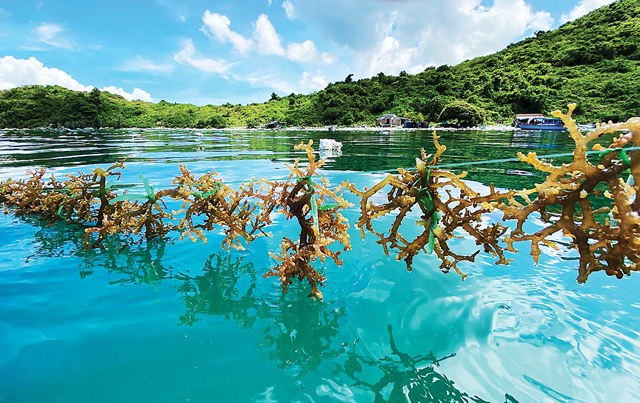Vietnam, with thousands of kilometers of coastline, possesses a diverse marine ecosystem, including a variety of seaweed species. This marine plant not only serves as a source of food and medicine but also offers an effective solution to address climate change.
Seaweed stands out for its exceptional ability to absorb CO2 compared to terrestrial plants. Some seaweed species can absorb up to 20 times more CO2 than trees in the same area, making them enormous "carbon sinks" in the ocean. This significantly reduces greenhouse gas emissions and mitigates global warming.
Seaweed: A Versatile Resource
Beyond its environmental benefits, seaweed also offers numerous economic advantages. It is a crucial ingredient in the food, pharmaceutical, and cosmetic industries. Compounds extracted from seaweed are used to create eco-friendly products such as agar, alginate, and carrageenan, which find applications in food, skincare, and even construction materials.
Vietnam has immense potential for developing the seaweed cultivation industry. With over 800 seaweed species, many of which have high economic value, Vietnam can become a world leader in seaweed production.
Carbon Credits: New Opportunities for Vietnamese Fishermen
One of the significant economic benefits of seaweed cultivation is the potential to generate carbon credits. By participating in the international carbon market, Vietnamese fishermen can sell carbon credits from the CO2 absorbed by their seaweed farms, generating substantial income.
 Seaweed's ability to absorb CO2 is 5 times faster than land plants, so seaweed farming also provides additional opportunities to sell carbon credits.
Seaweed's ability to absorb CO2 is 5 times faster than land plants, so seaweed farming also provides additional opportunities to sell carbon credits.
However, to fully exploit the potential of seaweed, several challenges must be addressed:
-
Lack of capital: Investing in seaweed cultivation requires significant capital to build infrastructure, purchase equipment, and cultivate seedlings.
-
Technology: Research and application of modern technologies are necessary to improve production efficiency and reduce costs.
-
Policies: Government policies supporting the sustainable development of the seaweed cultivation industry are essential.
To overcome these challenges, close cooperation among government agencies, businesses, and communities is required. The government should implement preferential policies to facilitate investment in this sector. Businesses should invest in research and development to create high-value seaweed products. And communities should be raised awareness about the importance of environmental protection and green economic development.
Conclusion
Seaweed is not merely a marine plant but a green treasure that offers numerous economic and social benefits. Developing the seaweed cultivation industry not only contributes to environmental protection but also creates jobs and increases income for people, especially coastal fishermen. With its immense potential, seaweed is poised to become one of Vietnam's leading industries in the future.
Source: Vietnamnet
GIANT BARB SCIENCE AND ENVIRONMENT JOINT STOCK COMPANY
📞 Hotline: +84 995 206 666
✉️ Email: info@giantbarb.com
🏢 Headquarter: No.07 Ton That Thuyet, Dich Vong Hau ward, Cau Giay district, Ha Noi